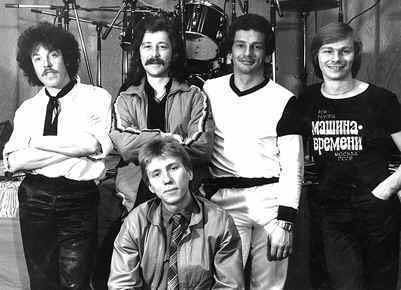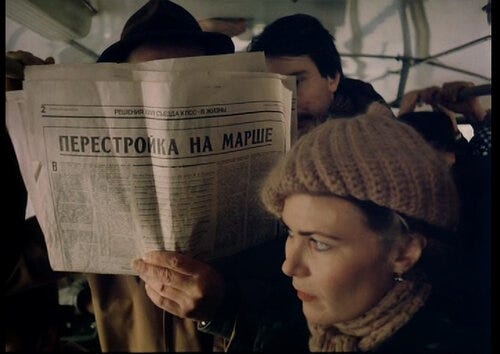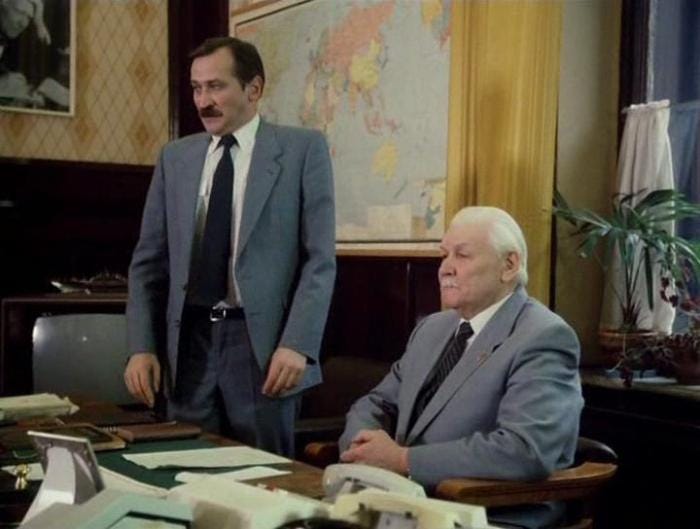(All translations[1] here are mostly literal which means you miss out on the rhythm and rhyme of the poetry.)
Time Machine

Unusually for someone of my generation who has almost never been to Russia, I am a big fan of the Soviet rock band Машина Времени (Mashina Vremeni, literally means “Time Machine”). I think they are rare in having both great melodies and instrumentation alongside interesting, poetic, often philosophical lyrics. I find their lyrics particularly compelling—so far I have not discovered any other group or artist whose lyrics compare in quality and topic diversity.
I have listened to almost every song put out by this band. Here are three I particularly like, with translated lyrics (headings link to YouTube):
Рыбка в Банке (Fish in a Jar)
Рыбка в банке на моём окне
Эта рыбка в банке счастлива вполне
Позабыла море — свой родимый дом
И не знает горя в банке за стеклом
Кверху, книзу — недалёкий путь
Даже телевизор виден ей чуть-чуть
Шторм ни разу не был, полный штиль всегда
Прямо с неба падает еда
Мир как в рамке: тихо и тепло
Он круглый словно банка, и ясный как стекло
Но нежданно к ней пришла беда:
Как-то в банке высохла вода
Translation
A fish in a jar on my windowsill
This fish in the jar is quite content
It has forgotten the sea—its native home
And knows no sorrow in the jar behind glass
From top to bottom is not a long journey
Even the television is slightly visible to it
There has never been a storm, always complete calm
Food falls directly from the sky
The world is like in a frame: quiet and warm
It’s round like a jar, and clear as glass
But unexpectedly trouble came to the fish:
One day the water in the jar dried up
Морской Закон (Maritime Law)
Есть в море закон, он стар как Земля
Открыт неизвестно где:
Если крысы бегут с корабля
Быть кораблю в беде
Крыса всегда крикнет «Беда!»
А значит, есть шанс на успех
За это били крыс иногда
Но при этом не так, чтоб всех
Но боцман решил, поскольку был строг
Серым устроить бой
И капитану он дал зарок
Всех перебить до одной
И были матросы против сперва
Но тот свою линию гнул
И, кстати, из крыс не ушла ни одна
Поскольку корабль не тонул
И поднят парус, и поднят флаг
Корабль сверкает весь
И под восторженный шёпот зевак
Уходит в далёкий рейс
И вахтенный крепко держал штурвал
И волны к корме неслись
И каждый матрос своё дело знал
И не было в трюме крыс
Но сутки прочь, и стоять невмочь
А ночью так тянет лечь
Никто не слышал, как в эту ночь
В трюме открылась течь
Из тех бы крыс хотя бы одну
И люди б тогда спаслись
Но славный корабль пошёл ко дну
Оставшись без верных крыс
Набей-ка трубку, налей вина
И выпьем, браток, с тобой
За тех, кто первым кричит «Беда!»
Спасая корабль свой
Translation
There is a law at sea, as old as the Earth
Discovered who knows where:
If rats are running from a ship
The ship is bound for trouble
A rat will always cry “Danger!”
Which means there’s still chance for survival
For this, rats were sometimes beaten
But not so much as to kill them all
But the boatswain decided, since he was strict
To wage war on the gray ones
And he made a vow to the captain
To kill every single one
And the sailors were against it at first
But he continued to insist
And, by the way, not a single rat escaped
Since the ship wasn’t sinking
The sail is raised, the flag is raised
The ship gleams all over
And to the admiring whispers of onlookers
It departs on a distant voyage
And the watchman held the helm firmly
And waves rushed to the stern
And every sailor knew his duty
And there were no rats in the hold
The day passes, and it’s unbearable to stand
At night one so wants to lie down
No one heard how that night
A leak opened in the hold
If only one of those rats had been there
Then people would have been saved
But the glorious ship went to the bottom
Having been left without its faithful rats
Light your pipe, pour some wine
And let’s drink, brother, you and I
To those who are first to cry “Danger!”
Saving their ship
Разговор в Поезде (Conversation on the Train)
Вагонные споры — последнее дело
Когда больше нечего пить
Но поезд идёт, в окошке стемнело
И тянет поговорить
И двое сошлись не на страх, а на совесть
Колёса прогнали сон
Один говорил: «Наша жизнь — это поезд»
Другой говорил: «Перрон»
Один утверждал: «На пути нашем чисто»
Другой возражал: «Не до жиру»
Один говорил, мол, мы машинисты
Другой говорил — пассажиры
Один говорил: «Нам свобода награда
Мы поезд куда надо ведём»
Другой говорил: «Задаваться не надо
Как сядем в него, так и сойдём»
А первый кричал: «Нам открыта дорога
На много, на много лет»
Второй отвечал: «Не так уж и много
Всё дело в цене на билет»
А первый кричал: «Куда хотим, туда едем
И можем, если надо, свернуть»
Второй отвечал, что поезд проедет
Лишь там, где проложен путь
И оба сошли где-то под Таганрогом
Среди бескрайних полей
И каждый пошёл своею дорогой
А поезд пошёл своей
Translation
Train car arguments are the last thing
When there is nothing left to drink
But the train keeps going, the window has gone dark
And there’s an urge to talk
And two people met, earnestly and sincerely
The wheels chased away sleep
One said: “Our life is a train”
The other said: “A platform”
One insisted: “Our path ahead is clear”
The other objected: “We can’t afford to be picky”
One said something like “We are the engineers”
The other said: “No, the passengers”
One said: “We are rewarded with freedom,
We take the train wherever we need to go”
The other said: “Don’t get too cocky
Just as we board it, so we’ll disembark”
And the first one shouted: “The road is open to us
For many, many years”
The second replied: “Not that many
It all depends on the ticket price”
And the first one shouted: “We go wherever we want
And can turn if we need to”
The second replied that the train will travel
Only where the rails are laid
And both got off somewhere near Taganrog
Among the endless fields
And each went his own way
While the train went its own
Song about bureaucrats

This song comes from the Soviet comedy “Forgotten Melody for a Flute” which I write about in this post.
Мы не пашем, не сеем, не строим
Мы гордимся общественным строем
Мы бумажные, важные люди
Мы и были, и есть мы, и будем
Наша служба трудна изначально
Надо знать, что желает начальник
Угадать, согласиться, не спорить
И карьеры своей не испортить
Чтобы сдвинулась с места бумага
Тут и гибкость нужна и отвага
Свою подпись поставить и визу
Все равно, что пройти по карнизу.
Нас не бьют за отказы-запреты,
Мы как в танках своих кабинетах
Мы сгораем, когда разрешаем
И поэтому все запрещаем
Нет страшнее бумажной постройки
Не страшны ей ветра перестройки
Мы бойцы, мы службисты- солдаты
Колоссальнейшего аппарата
Мы бумажные, важные люди
Мы и были, и есть мы, и будем
Мы не пашем, не сеем не строим
Мы гордимся общественным строем
Translation
We don’t plow, don’t sow, don’t build
We take pride in the social order
We are important paper people
We were, and are, and will be
Our work is fundamentally difficult
One must know what the boss desires
To guess, to agree, not to argue
And not to ruin one’s career
For paper to move from its place
Both flexibility and courage are needed
To put one’s signature and stamp
Is like walking on the precipice
They don’t beat us for refusals and prohibitions
We sit in our offices like in tanks
We burn when we permit
And therefore we forbid everything
There’s nothing more terrifying than a paper construction
The winds of Perestroika are not scary to it
We are fighters, we are service members, we are soldiers
Of the colossal apparatus
We are important paper people
We were, and are, and will be
We don’t plow, don’t sow, don’t build
We take pride in the social order

- ^
Translations produced by Claude with some light editing from me
I think Russia has a low standard of music, but a high standard of poetry and prose. That said, Russian song lyrics aren’t the best example of that. Actual Russian poetry is much stronger, if you haven’t read Pushkin you’re in for a treat.